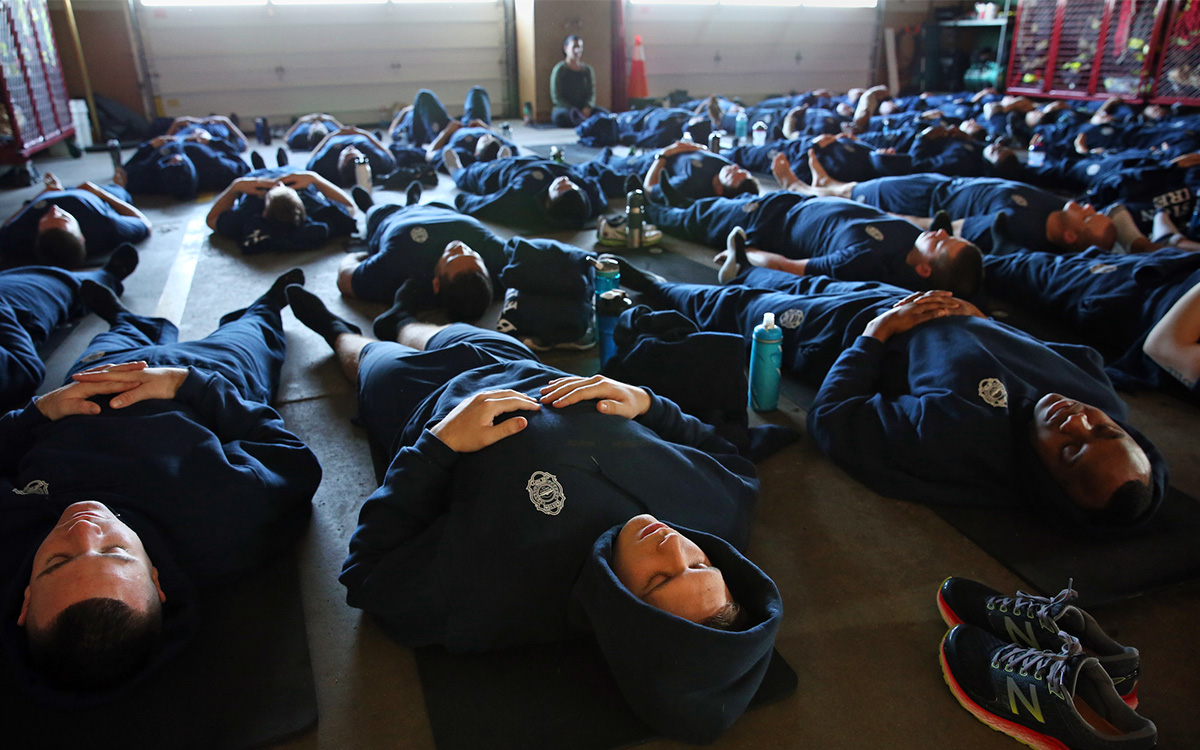In a normal year, America’s best sleepers average more than eight hours of slumber. They’re in bed by 10:45 p.m., they don’t snore, they know not to drink caffeine after lunch or eat a snack after dinner. This rare, blessed breed wake up every day in a mood that is statistically happier than the rest of the country.
But even they have struggled over the last 12 months. The pandemic has utterly upended sleep routines; early research has pointed to quarantine habits that destabilize circadian rhythms, like an uptick in screentime or a downswing in time spent outside. With gym routines disrupted, meanwhile, many are either exercising less — which isn’t ideal, physical movement throughout the day is a great way to beat insomnia — or are perhaps forced to exercise in the same room where they sleep, which can contribute to poor sleep hygiene.
And what felt like a small win a year ago (no more commuting!) has long since faded. As The Economist pointed out, we’re not exactly putting those extra hours to good use in the WFH era. We’re just working later. This has all created a punishing cycle rife with crazy dreams, cracked jaws and nicknames no one asked for, like “coronasomnia.”
A quality kip starts with an ideal sleep latency, which is the amount of time it takes you to make the leap from wakefulness to sleep. The right place to be is 10 to 20 minutes. Don’t be so impressed by your family member or friend who can accomplish it in five minutes or less. Good for them for having such an uncluttered brain, but any transition that short is probably a sign of pathologic sleepiness.

The pandemic has made acute insomniacs of us all. In order to avoid those punching-the-pillow episodes, it helps to A) have a reliable wind-down routine, as sleep thrives on predictability, and B) think outside the box a bit. The first point is straightforward: head to bed at the same time every night, try to keep your phone out of the bedroom, make sure your environment is dark, cool and comfortable. To the latter point, though, it can help to recruit some “outside help.”
From an OTC perspective, for most people, that could mean a boost of melatonin. On nights where I’m worried about falling asleep, I’ll generally take 3mg of melatonin as a fail-safe. Sometimes I’ll just put it on my nightstand with the intention of taking it, and wake up with it still there, having fallen asleep after all. It’s a hormonal solution, so melatonin is a pretty overt way to address sleep. There are some concerns with the habit, though. You don’t want to develop a dependency on taking that extra dose (the body is supposed to produce melatonin during the day), and sometimes, it makes dreams even crazier. Like, “Do my dreams usually involve that much blood?” crazier.
An alternative solution to manipulating sleep-wake timing? Directly relax the body. That can be achieved with another chemical that starts with an “m” … magnesium. I didn’t know much about magnesium before I tried it in supplement form. I knew it was a mineral, that you could find it on the periodic table, and that certain fish have a ton of it. But in the most basic sense, magnesium supports muscle function. People with low magnesium levels are likely to experience fatigue and muscle weakness.
While Americans could stand to eat more magnesium-rich foods, it’s pretty rare to be medically deficient in magnesium. Supplemental magnesium, then, is largely used as a way to activate the parasympathetic nervous system. In other words: magnesium binds to specific receptors, which sends signals to the body to calm down. It makes sense — people with lower levels of magnesium often experience twitches or cramps. That’s one reason the mineral has been used to address restless leg syndrome.

How does this relate to your crap pandemic sleep? Well, it’s worth your time to start mixing a teaspoon of magnesium with warm water just before bed. I’ve been on that grind for a couple months now. Here’s my six-year-old’s review of the sensation it yields: it makes my arms and legs heavy. Seriously. I feel satisfyingly sluggish after I take a bit of magnesium. It doesn’t make me sleepy, but it puts me in a state that is conducive to sleep.
There are some parameters, of course. You don’t want to take more than the daily allotment of 350 milligrams. Even approaching that level could mess with your bowels. We’ll leave it at that. But I’ve found that a teaspoon of magnesium powder (which is half that amount) is enough to usher in some relaxation. If you’d rather not drink it, magnesium gummies exist. But I will happily vouch for Calm’s powder mixture.
It’s the routine of taking magnesium, not just the mineral, that helps put me in the right mood. Making it at the same time every night, sipping the warm glass, hopping in the shower after. It’s brought a routine back to the end of my days, at a time when I sorely need it; the fact that my muscles get all cozy is a hell of a bonus.
As someone who diligently tracks his sleep biometrics (look into WHOOP or Oura, if that’s on your to-do list this year), I can confidently say that Calm has played a role in optimizing my sleep latency. My days are still super stressful — I’m feeling the effects of isolation and burnout like everyone else — but my nights have gotten a bit more predictable.
There’s an old tip for insomniacs: starting with your feet, and progressing all the way up to your shoulders, imagine each of your muscles heavy and sinking into the bed, until you feel relaxed enough to fall asleep. That game is a little easier with a little magnesium.
This article was featured in the InsideHook newsletter. Sign up now.





















